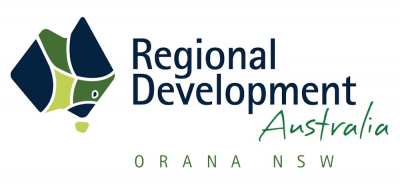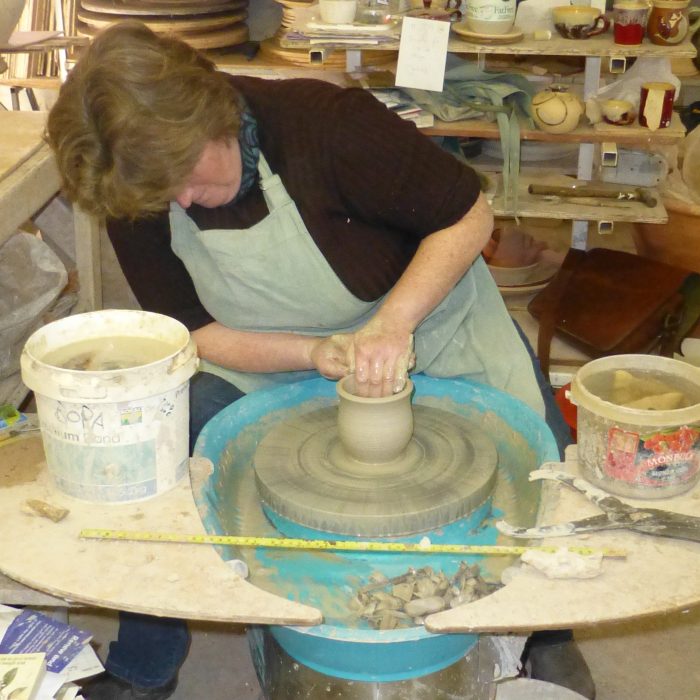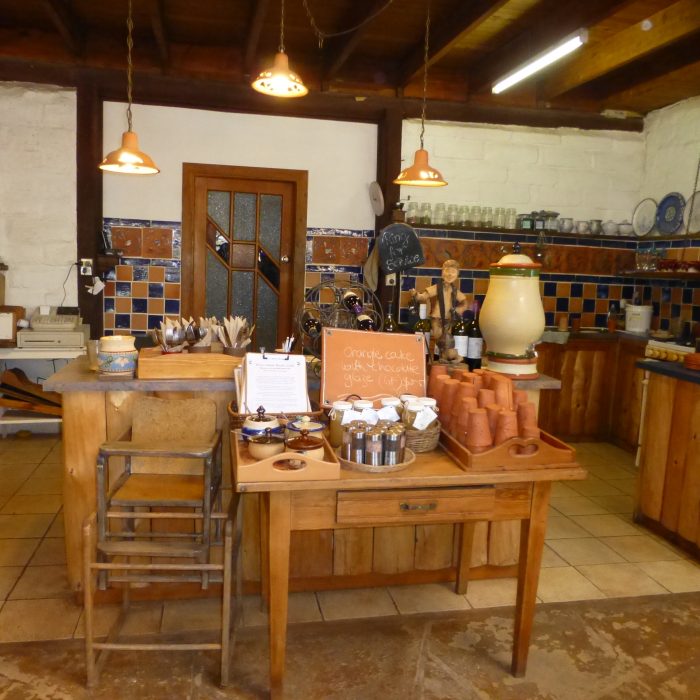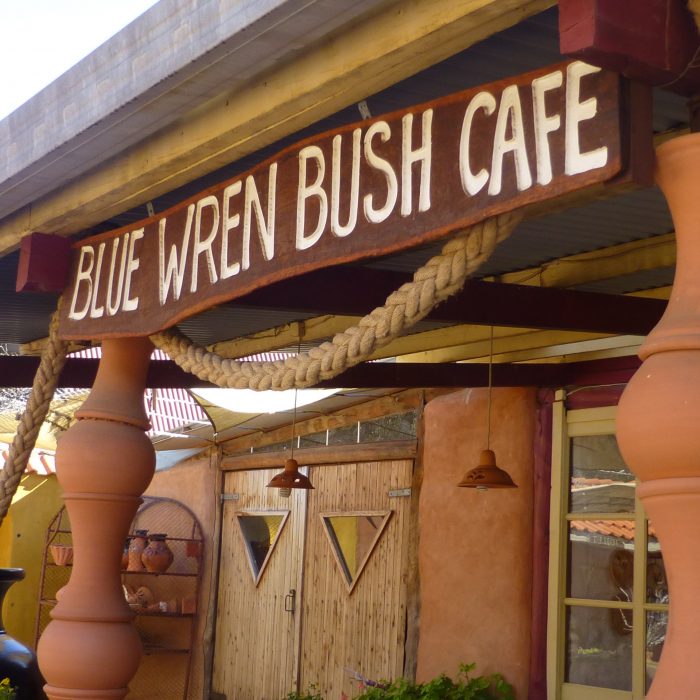Business: Pilliga Pottery, Pilliga
Maria Rickert was a young migrant from Germany when she decided to make her home and livelihood on the edge of the Pilliga National Park, north of Coonabarabran.
She and former husband Richard had a feeling about the native bushland, which had a sense of peace and belonging they had never experienced before.
They travelled from Muenster, a picture postcard city near the Dutch-German border on what was a journey of great significance, settling with two young children and forging a natural lifestyle among the gum trees.
“Thirty-five years ago, we came as backpackers and wanted to do to this,” she said.
Mrs Rickert immediately loved the tranquillity of the Dandry Rd location.
‘We decided that we had to buy this property. I felt at peace,” she said.
“I felt that I belonged.”
Like modern-day colonials, they built the farm with their bare hands, using respected design principles to influence their construction.
“We built the house using mud bricks, timber and rocks which we sourced ourselves and the Rudolf Steiner school of organic building with our own resources.”
“I came from a dairy farm so I was very practical,” she explains.
By this stage, Mrs Rickert was pregnant with their third child, and they later became parents to a foster child, adding to their loving brood.
They started making pottery, as they had done in Germany, while also working off-farm.
“In Germany, we had a very successful pottery business. We studied there to that end. My husband Richard started teaching ceramics at TAFE in Coonabarabran.
Maria worked for the German government helping disadvantaged young people. She had previously worked as a Kindergarten teacher.
Their income created capital for them to invest in their pottery business. They bought a kiln and during the first 10 years, they sold Pilliga Pottery in a wholesale capacity around NSW, to clients in Sydney, Mudgee, Dubbo and Port Macquarie.
The Rickerts started a school, which was attended by their children, Eva, Johannes, Bernhard and Telline, who studied by distance education with a governess, Julie Squire.
Mrs Rickert started making smaller items, working a lot when her children were asleep.
At that time, garden ceramics were a niche market and Mrs Rickert began creating her own designs. Pottery engraving also came to the fore.
“Garden ceramics was really needed. There were hardly any imported then,” she explained.
“I often worked at night on cherubs and fairies. I started to go to markets, shopping centres and exhibitions.”
Customers were curious about the product and wanted to visit the farm to see the pottery’s origin.
“People were interested in the story, they came to visit us. We set up the studio.”
The Blue Wren Bush Café was set up to cater to visitors, selling coffee and cake. Their menu now includes scones made with love, German cuisine, wood fired pizzas and gelato.
When guests wanted to extend their stay, the Rickerts began offering accommodation.
“People started coming to stay; the demand was there. It was about finding what people wanted and us reacting to it. We were ready to embrace and pamper them.”
Many are hugged by either Mrs Rickert or one of her children or grandchildren upon arrival and it’s a wonderful warm way to welcome. There’s now six family members and a handful of staff working on the property.
“I live emotionally. There’s no formality.” She laughs and her face lights up. It’s no surprise that so many guests return to this property after their first visit.
The Barkala Farmstay offers a choice of accommodation styles, and visitors can sleep in the Old Schoolhouse, The Poet’s Cottage, The Farmhouse, The Studio or the Eagle Valley Cottage or go camping in the bush.
While the setting is the Australian bush, many of the buildings have a distinct European flair, paying homage to the Rickert family’s heritage.
Mrs Rickert said the farm stay is not five-star accommodation but offers charm and authenticity.
“Particularly for families, we like to show kids how it was in the olden days. When people come here, they have no mobile phone reception, there is TV.
“There are pottery classes, animals, milking the cows, board games, bushwalking. It’s a really earthy lifestyle here. I also like the pioneer lifestyle, it’s very real and we don’t put on any pretences.”
The Rickerts believe in being close to nature as much as possible and they are pioneers in renewable energy and sustainable living.
“We were the first people with a solar power system in the area,” she said. “We could see people talking about solar energy when I was 19, back in Germany. We were influenced by family and friends.
“We believed in another way of using technology to have less of a footprint on the planet. That was very important to us. I don’t believe in fossil industries when there’s so much to use. It was expensive at the time, but we believed in it.”
Their renewable stance includes a wood stove, solar air conditioning and a greenhouse and garden where herbs, flowers and vegetables are grown using permaculture.
“In a European country we would be more judged, but here we can give it a go,” Mrs Rickert said.
Although their love of nature has contributed greatly to their lives, this idyllic lifestyle has been threatened in recent times by crippling drought.
“The drought has been hard, we’ve had to buy water,” Mrs Rickert said.
They have also established a bore on the 5260ha property and grown saltbush as a food source for livestock.
“Everyone in Australia should be careful (with water). It’s very disrespectful to flush water away when so many communities need it.”
Mrs Rickert also recognises and respects the traditional culture of the landscape.
“Australia is a young country with an old culture. Meeting indigenous people, through them, I got a look at how they live, their values, and gained awareness of culture. They are very friendly people; very open and tolerant.”
Just as they embrace those who walk through their door, Mrs Rickert and her loved ones have been welcomed by the Pilliga community.
“We are really linked to the community and get lots of support from Narrabri and Coonabarabran,” she said.
When people come to visit, they tend to stay for the weekend or longer.
“We offer good hospitality, unique accommodation and we are very creative. “
In the future, Mrs Rickert said they would like to go organic, they aim to increase visitation to regional Australia, offer yoga and meditation retreats, have an airstrip, and continue their commitment to the Regional Platters philosophy.
While her way forward has not always been a straight path, Mrs Rickert has not diverted from her journey. The evolution of the business has moved from wholesale to becoming a well-known tourist attraction and farmstay, with pottery-making on site.
“I don’t doubt my journey. I work out my value when I start on a journey and I put everything into it.”
To her, nothing is a challenge.
“One door closes and one door opens. We have a very strong family perspective. Life is perfect and the world is perfect, but you have to tap into that.
“This place, it’s more than I imagined. I put a foot into the big world. Everything is possible. I’m a dreamer whose dreams come true.”



